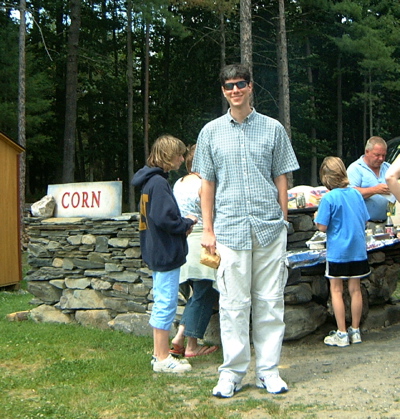Vermont Travels: June 25-27, 2004
Chapter 1: Getting Started (Friday, June 25)
After a leisurely morning at home, at 10:15 we’re gassing up Zipcar Mini Micah at the corner of Columbus and Mass Ave, ready to head out for our weekend away. Robert’s driving, and we have a thermos of icy lemon-water in the car, snacks and fruit, and maps and plans. Though the purpose of the trip is ostensibly David and Wai Yee’s wedding on Saturday at noon in Leicester, Vermont, we’ve decided to make the weekend an ambling, holiday-filled relaxing trip in celebration of food and animals.
Our first stop, though, is an abortive one: we stop at Queechee Gorge, off Route 4 just over the Vermont-New Hampshire border on I-89, in hopes of some of the best corn on the cob we’ve ever had. Two years ago, at this very spot an old man roasted corn on the cob on an outdoor charcoal fire and sold the ears wrapped in foil and drenched in butter and spices; this year, however, he’s gone, said to be returning on Sundays and “some” Fridays. I’m driving the mini, now, so we get back on I-89 and keep going.
Chapter 2: Robert and the Cows
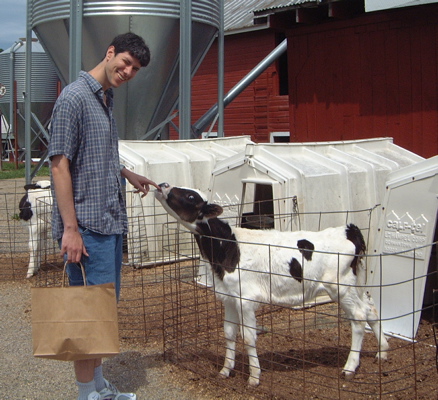 A
little further on, at exit 4, we leave 89 in search of Neighborly Farms, an
organic cheddar family farm I read about on the Vermont Cheese Trail. We get
a little lost, and then find ourselves on an extremely bumpy dirt road. Robert
snaps pictures of cows in the distance as I drive—these cows may actually
be the cheddar-producing cows, you see. When we get to the farm, we go in
and watch the cheese-making process through a big window. Currently, they’re
making Monterey Jack, which they like to do on Fridays (so Sue the friendly
bookkeeper tells us) because it’s a shorter day than making cheddar
or feta, since it doesn’t get cheddared (slabbed, or pressed into blocks),
in order to preserve its moister texture.
A
little further on, at exit 4, we leave 89 in search of Neighborly Farms, an
organic cheddar family farm I read about on the Vermont Cheese Trail. We get
a little lost, and then find ourselves on an extremely bumpy dirt road. Robert
snaps pictures of cows in the distance as I drive—these cows may actually
be the cheddar-producing cows, you see. When we get to the farm, we go in
and watch the cheese-making process through a big window. Currently, they’re
making Monterey Jack, which they like to do on Fridays (so Sue the friendly
bookkeeper tells us) because it’s a shorter day than making cheddar
or feta, since it doesn’t get cheddared (slabbed, or pressed into blocks),
in order to preserve its moister texture.
We talk a lot to one of the cheesemakers, who lets us taste the as-yet-unsalted curds, to Sue, and to two guys who are about to milk the cows. They show us the four youngest cows, who range in age from four to eight weeks, and we watch them suckle the men’s fingers (the cows were just weaned, they say). Robert offers/threatens to feed the cows pop-tarts: “They’re organic pop tarts,” he says; Sue still very politely dissuades him, saying that he can if he wants, but that if we do feed the cows, we “don’t tell anyone” and then come in and wash our hands. I find this hilarious, but we manage to restrain ourselves from feeding the cows.
The small cows, standing outside their cute little “calftel” huts, actually are just having a drink of water as we watch, and they drain their blue bucket-fuls, and then keep slurping at the bottom of the bucket until it’s taken away. We buy lots of cheese: aged cheddar curds, Monterey Jack, raw milk cheddar, and feta. The feta is amazing—the best cow’s milk feta we’ve ever had, with beautiful texture. The raw milk cheddar is sort of a classic cheddar, very tangy and delicious. The cheddar curds are just fun to eat, especially since we had just had an earlier, rubberier, stage of them. We emerge, extremely pleased with our cheese detour, and very pleasantly surprised at the friendliness of the staff, who all seemed happy to answer our uninformed city-folk questions, even though the farm—to put it mildly—seemed not really to be in the habit of hosting too many tourists.
Chapter 3: Boats and Strawberries
We drive straight to Burlington, nibbling on cheese, grapes, and my homemade wheat mango-cashew bread along the way through a small rainshower. When we get there it’s around 3:30 and we’re feeling worn out from driving and cheese. We drive around, locating the main streets, and decide that Burlington is a cute little Berkshires-like, Berkeley-like town. We note, in passing, an apparently cheap motel right on the main street, as we drive toward the lakeshore.
Parking our Mini in a meter a block from the docks, we walk down to the shore of Lake Champlain, and head into the Burlington Shipyard to watch workers put the finishing touches on a replica of an 1860s tallship/barge that sailed around the lake and the canals. A volunteer from the Lake Champlain Maritime Museum tells us that the boat, modeled after a nearby wreck and built because there are no known existent specimens of this kind of boat, is due to be launched and fitted with sails next week. Robert, true to his difficult-question-form, asks, “Isn’t it not a good idea to build your boat exactly from the plans of a shipwreck?” and the woman laughs, and explains that the wreck in question crashed because once, after it had been in service many years, a cargo of bricks was improperly stowed, and the boat caught a small wave, the bricks shifted, the boat tipped and caught a bigger wave, and ultimately went down. She strongly implies that the new model—built after divers took photographs of the wreck, and built with a movable centerboard instead of a keel for navigating the shallow canals and locks—would not have any similar brick-cargo-problems. We poke around the shipyard a little more, and then share a soft-serve ice cream as we walk back toward the main streets.
On a sidestreet near our parking spot, we go into an antiques store that’s more like a church rummage sale in price than most “antiques” stores we know of. So, although we don’t buy anything, it’s very satisfying to pick stuff up and consider it, knowing that $4 for an old, pretty blue glass apothecary bottle, or $11 for a mink hat, or even $400 for a great full-size carved church pew, is really not excessive. Robert vetoes the pew on space in our apartment, not, surprisingly, either cost or space in our mini car. We return to the car in question, feeling invigorated, and we drive about fifteen minutes north to Colchester to Sam Mazza Farms and Fruitstands, which I’d read had pick-your-own strawberries.
Strawberries there are indeed, fields of them, for $1.50 a pound, and obviously as many as you care to eat while picking. We picked $9.70 worth, which we realize even as we’re picking is excessive, but the berries are perfectly red, throughout, and perfectly sweet. We don’t see berries like this in stores, and we go slightly wild, spending forty-five-minutes in the field. When we have our full box, and when Robert has observed—from afar, as I claim they’re mean and dangerous—a yard of wild turkeys nearby, we go over to the farmstand and buy wine and maple mustards as Vermont souvenir gifts for ourselves and friends.
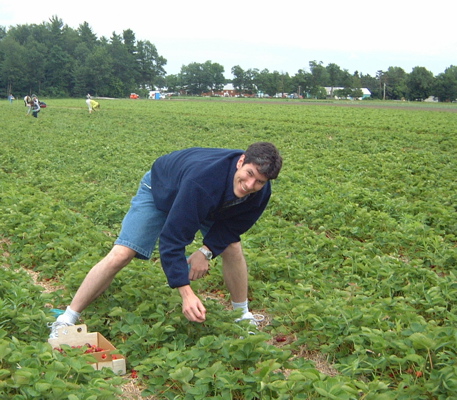
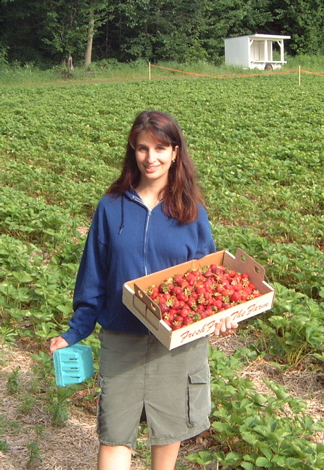
Chapter 4: Motel What?
Driving back from Colchester to Burlington, where we wanted to eat dinner, we pass a Motel 6 with no vacancy, and we begin to become panicked about motel rooms. No longer young and crazy, looking for a motel until 9:30 or 10:30 at night as we did on earlier trips to Illinois and across the country, we return to the cheap motel—the Midtown Motel, it’s called—in downtown Burlington. Yes, they have a vacancy—$55, which is $5 cheaper than the Motel 6, but which still seems like a lot for way the heck out here. Robert does his risk-adverse, city-boy, “let’s-see-the-room” routine. We cover the “no American Express accepted” ground, by now familiar. We are asked each for ID, which seems unusual, and which I nearly balk at, but Robert is shooting me “please don’t be crazy, please don’t be crazy” look, so I don’t.
Finally, we take the room. I look on the bright side: As long as it has ice and a bathroom, I say, I’m fine. Who needs a comfy bed? One of our favorite motels, the well-known Bumbleberry Inn in Zion Canyon, had one of the hardest, flattest, most back-breaking mattresses we’ve ever slept on—but they had location, and sheep in the backyard, and bumbleberry breakfasts in the restaurant. Who needs a remote control or a phone? Another of our fondest motel-memories is of a small shack—er, cabin—in Wall, South Dakota, with no such amenities, though the place was apparently popular enough for our friend Jesse to have stayed there separately on his own cross-country drive.
Well, surprisingly, our motel in Burlington manages to have brand-new, fairly comfortable, mattresses—they leave the old ones outside, in a ramshackle trash pile near the office, in order to prove it to you. The place also manages to have only one lightbulb in the room (the others seem broken, so it’s rather dim as I type this), no phone (never fear—our cellphones actually get service in Burlington), no remote (Robert sits perched on a straight chair next to the TV for half an hour, channel surfing), and, to top it off, no ice. The “manager” who checked us in suggests we go across the street to get ice. As we gaze across the street, Robert voices both of our thoughts when he says, “Wow, it’s really nice when a motel relies on the nearby gas station to provide fancy amenities like ice.” We decide to live without ice until the morning, when we will probably need to chill the strawberries in the car for the drive and refresh our lemon water-thermos. The berries, by the way, are the sweetest, most strawberry-tasting strawberries we’ve ever had—perfectly ripe and beautifully formed. Robert learned something surprising (to him): that strawberry-red strawberries are actually sweeter and better than the raspberry-red strawberries (very slightly overripe) he’d originally started picking.
Chapter 5: “Dinner”
Another of
the benefits of our motel is its location. First of all, we are right next
door to a fire department (real, not volunteer), which really makes me feel
secure. The motel also has a great view: The broken vertical blinds in our
room allow a nice gap so I can keep an eye on the firemen and their truck
during the night.
We leave our car below the motel, and walk over to Nectar’s, a restaurant
and bar a block away. I’d read that Nectar’s has good gravy fries—french
fries with turkey gravy on them—so we order an open-face turkey sandwich
with gravy fries—this essentially means that the entire plate is covered
in gravy. Robert gets suckered in by the menu’s NYC hotdog: a hot dog
wrapped in bacon and then deep-fried, so he orders that with frychos (nacho
toppings on french fries). Everything’s good, the hot dog juicy, the
gravy tasty, and the nacho toppings fresh and nice. The french fries themselves
are only adequate, though we love the treatment of them—given better
fries, the meal would really be super.
Chapter 6: Drive-In Bliss
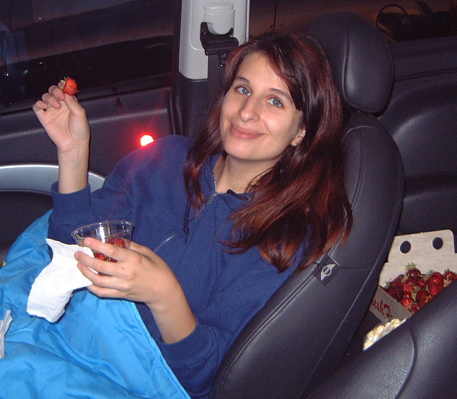 Leaving
dinner, we walk down Church Street, which seems to be a small-town version
of the Third Street Promenade in Santa Monica, California. I read that it’s
the fifth-most-popular tourist destination in Vermont, and we ponder that
fact as we walk along. We order a marshmallow-nutella crepe from a stand,
and Kettle Corn from another one, and then we stop at a drugstore at the end
of the street to buy an Itch-Eraser: I have so many giant mosquito bites from
the strawberry fields that my legs are one large red itchy blotch by now.
Leaving
dinner, we walk down Church Street, which seems to be a small-town version
of the Third Street Promenade in Santa Monica, California. I read that it’s
the fifth-most-popular tourist destination in Vermont, and we ponder that
fact as we walk along. We order a marshmallow-nutella crepe from a stand,
and Kettle Corn from another one, and then we stop at a drugstore at the end
of the street to buy an Itch-Eraser: I have so many giant mosquito bites from
the strawberry fields that my legs are one large red itchy blotch by now.
Picking up our car, we get directions to the area’s only drive-in, back up in Colchester about fifteen minutes away. I’m actually a little disturbed by the way we get the directions: upon asking in the gas station, I find one clerk who says he has no idea, he’s just moved here, and another clerk who says he never goes to drive-ins. (I mentally excuse this, because he’s old.) A young guy buying cigarettes says he knows how to get there, and he borrows a pen, paper, and a map from the clerks and then sits us down at a small table to walk me through the directions. A table and chairs in a gas station? Sitting at them with a strange guy to get directions? They happen to be very thorough directions, but it was an odd experience.
By the time we get to the drive-in, it’s 8:45, and the movies are going to start at 9:00. We choose the first screen, a triple feature: “Dodgeball,” “The Chronicles of Riddick,” and “The Day After Tomorrow.” I curl up in the front seat with our beach blanket around my legs, with strawberries and with Kettle Corn, and I’m set. Robert, and his long legs, are somewhat more uncomfortable, but they eventually settle down too, and we enjoy “Dodgeball” together before deciding we’re too sleepy to make it through the next two movies.
Chapter 7: Pre-Wedding (Saturday, June 26)
I find out near morning yet another advantage of our nighttime accommodations: an hourly wake-up call, in the form of a clock striking the hour at a church across the street. Even in “midtown” Burlington, things are so quiet that I definitely hear the clock at five, six, seven, and eight o’clock. I may have heard it at one, two, three, and four o’clock too, but I probably blocked them out of my mind. The shower in our bathroom has two knobs, as usual. Unusually, the left one is labeled “Cold,” very clearly, and the right one is unlabelled. I spend about ten minutes listening to the label and waiting for the “hot” water to heat up before I give up and realize that “Cold” is really the hot one. Meanwhile, Robert finds a wallet under the bed, and when he turns it in at the front desk, is regaled with a tale about an infamous mugger who had stayed in our room and managed to dispose of the evidence of his latest crime before the police apprehended him. “Thanks—we looked for that wallet everywhere,” the front desk guy says. I roll my eyes: apparently no one ever looked under the bed.
We breakfast on strawberries and feta and raw milk cheddar, and then we buy ice at the gas station to top off our lemon water, and start driving south toward the wedding in Leicester. I drive down Route 7, a pleasant little winding Vermont road, and we pull into the A&W drive-in in Middlebury at five to eleven. They open at eleven, so we’re soon enjoying a really excellent cheeseburger, much better than average fries (skin-on, crispy—we both think the A&W should serve them with gravy, or at least cheese, for more options), and an on-tap A&W rootbeer float in a frosty mug. The waitress rollerblades everything over to our car, and even takes a picture of us when we ask. We leave, fortified, at 11:25 to head to the wedding, and we get there just at ten to noon.
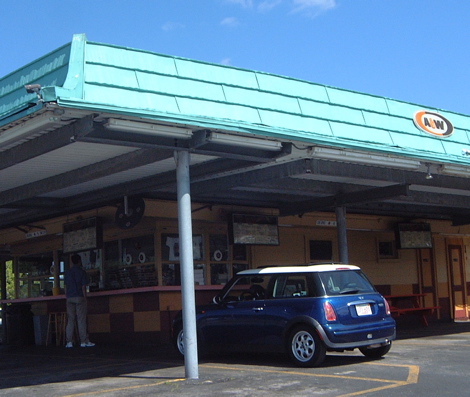
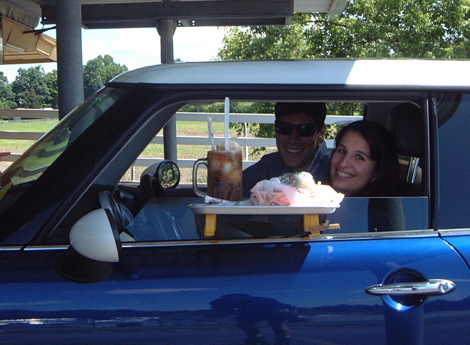
Robert almost laughs out loud when he sees the appetizers at the wedding: a huge basket full of strawberries, crackers, and local Vermont goat cheese. “This is what we’ve been living on!” he wails, and confides to another man that he is sick of strawberries and desperate for meat. Even though I remind him he had a bacon-wrapped hot dog last night, and a cheeseburger for brunch today, he still droops at the sight of more strawberries, cheese, and crackers. Read about the wedding here, and then return to read more about the rest of our weekend.
Chapter 9: Alpaca Farm-Stay
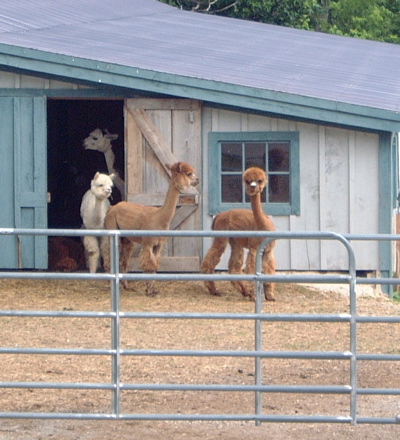 At
around 4:00, after the wedding, and with injunctions to return around 8:00
or 9:00 for a bonfire and roasted marshmallows, we set off to find the place
I’d made a reservation at for tonight’s stay. I’d stumbled
upon the Champlain Valley Alpaca Farm and Farm-Stay on the web, and when they
had a vacancy, sounded friendly and off-beat, and weren’t more expensive
than a hotel room ($70 for two in a studio apartment), I’d made a reservation,
although in retrospect, “reservation” is a rather inappropriate
word. You mail in a personal check for $35, and then bring $70 in cash when
you show up, I was told; our hosts then rip up the check and take the cash.
At
around 4:00, after the wedding, and with injunctions to return around 8:00
or 9:00 for a bonfire and roasted marshmallows, we set off to find the place
I’d made a reservation at for tonight’s stay. I’d stumbled
upon the Champlain Valley Alpaca Farm and Farm-Stay on the web, and when they
had a vacancy, sounded friendly and off-beat, and weren’t more expensive
than a hotel room ($70 for two in a studio apartment), I’d made a reservation,
although in retrospect, “reservation” is a rather inappropriate
word. You mail in a personal check for $35, and then bring $70 in cash when
you show up, I was told; our hosts then rip up the check and take the cash.
We arrive around 5:00 at the address from the website—signs indeed clearly advertise alpacas (“The Farm with the Friendly Alpacas” seems to be their slogan). For now, four friendly cats greet us and walk us over to the office door. We wander in. “Hello?” we ask. “Hello! HELLO? HEL-LO!” No one appears to be there, and we have no cellphone service to call. “HELLOOOO!” Robert is sounding positively panicky as he calls, as if the next “Hello” will summon rage-infected zombies. I plead with him not to be so funny: He knows, and I know he knows, that when he wanders around the (completely deserted) house, farm, barns, yards, and driveways, calling “HELLO” in louder and louder tones, I can only think of the beginning of “28 Days Later,” and poor Jim, pitifully calling “HELLO!” as all of London lies deserted in front of him.
The alpacas wake up at our calls, and come out of their barn to say hello. Cats, alpacas, and we are all similarly startled when it suddenly begins to rain. We take refuge in the office, where, by the way, there actually are lights on, and where no doors were locked. The cats remain outside, eating from a plastic container labeled “lobster meat.” The alpacas just get wet. Shorn for the summer months, they are cute in a “My-Little-Pony” long-and-short-haired way. We stand in the office, and when the phone rings, Robert turns on the volume of the answering machine, desperate for human contact. “Hi, honey, I’m just leaving the mall now, I’m a little behind schedule, but I’ll be home soon, and. . .”
“Hello!” Robert picks up, butting into the woman-answering-machine conversation. “Um, I think we’re staying here?” he says. I listen to his side of the conversation: “The wrong farm? Um, which one? Well, there are cats, and alpacas, and—no, no one’s here. I’m sorry for answering your phone, we just. . . Oh, the other farm. Okay. The second house. Barn behind the house. Stairway up the barn, inside. Um, where do we get the key? I mean, how do we get inside? Well, we’re kind of city folks, so how do we know we’re in the right place? Okay. Okay, thank you.”
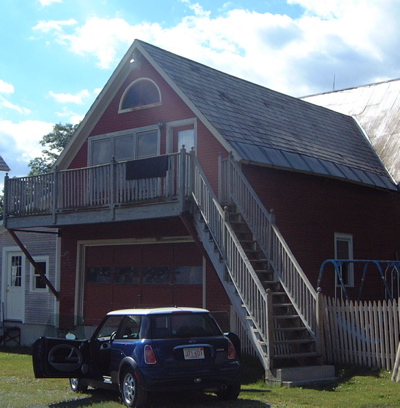 Silently,
I hold open the office door, and we go out into the rain, leaving behind the
cats who desperately wanted to climb into our Mini and eat strawberries with
us. We drive to the other location of the alpaca farm, just down the road,
and sure enough, when the rain clears we see an outdoor stairway up the side
of a barn, as instructed.
Silently,
I hold open the office door, and we go out into the rain, leaving behind the
cats who desperately wanted to climb into our Mini and eat strawberries with
us. We drive to the other location of the alpaca farm, just down the road,
and sure enough, when the rain clears we see an outdoor stairway up the side
of a barn, as instructed.
“Interesting,” Robert says. “We’re staying in a barn over alpacas.” I have my doubts, myself, but having gotten us into this, I’m not going to back down now. This place is deserted too, but we climb the stairs, and let ourselves into a very nice, clean, prettily-furnished small studio, with an amazing four beds covered in patchwork quilts. There’s a bathtub room which is clean and relatively modern-looking, a small kitchenette, and a separate half-bathroom, which at first glance appears completely normal. We soon realize that the toilet empties with no flush down a hole into a compost pile, and that the water to the whole apartment seems to be turned off. As long as the toilet doesn’t smell (it doesn’t), I find it merely bizarre but acceptable.
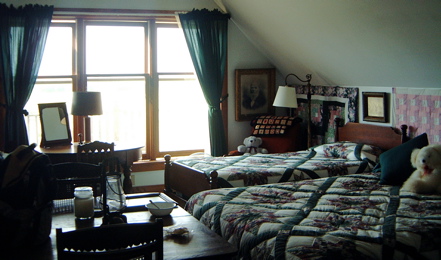 Meanwhile,
we update our priorities: 1) Find a person. 2) Get water. 3) Always ask in
advance if a room has a key. “Does it have electricity?” Robert
asks. Yes, it does. The sun is out, and the alpacas are grazing in a field
below our window. I put our strawberries in the refrigerator, and we eat a
bowlful with cream and sugar from the kitchenette. We’ll eventually
return to Leicester for the bonfire, but for now we’re perfectly content.
I should add, too, that when in the apartment you don’t even feel like
you’re over a barn, much less a working one—it’s a perfectly
serviceable place to spend the night. In fact, we relish the contrast from
the Midtown Motel!
Meanwhile,
we update our priorities: 1) Find a person. 2) Get water. 3) Always ask in
advance if a room has a key. “Does it have electricity?” Robert
asks. Yes, it does. The sun is out, and the alpacas are grazing in a field
below our window. I put our strawberries in the refrigerator, and we eat a
bowlful with cream and sugar from the kitchenette. We’ll eventually
return to Leicester for the bonfire, but for now we’re perfectly content.
I should add, too, that when in the apartment you don’t even feel like
you’re over a barn, much less a working one—it’s a perfectly
serviceable place to spend the night. In fact, we relish the contrast from
the Midtown Motel!
Eventually, we accomplish goal #1, when Jenny Foshay, one of the owners, and her eight-year-old daughter appear outside the barn yoo-hooing for us. Robert and the daughter go down into the barn to try to turn on the water, and Robert gets scared by a horse: “I don’t really like creatures bigger than me,” he says. We get recommendations on area fine dining, as well as the location of the nearby, brand-new (actually still in their grand oppening, landscaping phrase) supermarket. We agree to go to the other farm—where the family, and the female alpacas, live—tomorrow morning to pay and “check out.” Everyone is friendly, and we wash up and leave to return for the bonfire—locking my laptop in our car, just to be safe.
Chapter 10: Saturday Night Revels
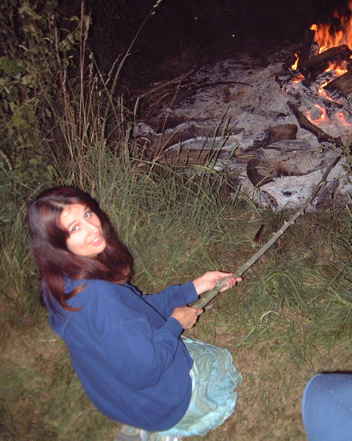 Our
giant bag of Kettle Corn, the ears of corn on the cob we throw into the coals
whole, in their husks, and the package of Vermont-made all-natural-casing
hot dogs we char on sticks (alternating with marshmallows) on the bonfire
make a big hit with the others. Robert and our host find very small green
branches (Robert insists they were actually trees), maybe an inch in diameter
at their thicket point and six or seven feet long, and after stripping off
the bigger branches and burning the smaller ones off in the fire, I whittle
down the ends with a penknife into clean, pointy skewers for hot dogs and
marshmallows. We stay, cooking and talking and eating, until around midnight,
when we leave for a night near
Our
giant bag of Kettle Corn, the ears of corn on the cob we throw into the coals
whole, in their husks, and the package of Vermont-made all-natural-casing
hot dogs we char on sticks (alternating with marshmallows) on the bonfire
make a big hit with the others. Robert and our host find very small green
branches (Robert insists they were actually trees), maybe an inch in diameter
at their thicket point and six or seven feet long, and after stripping off
the bigger branches and burning the smaller ones off in the fire, I whittle
down the ends with a penknife into clean, pointy skewers for hot dogs and
marshmallows. We stay, cooking and talking and eating, until around midnight,
when we leave for a night near 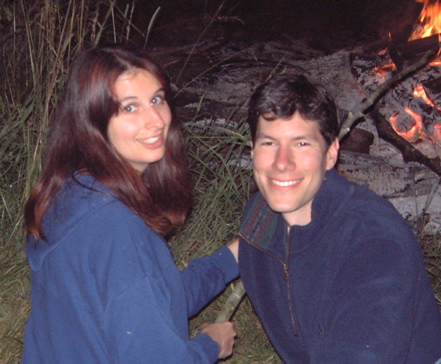 alpacas.
alpacas.
Chapter 11: Breakfast and Back on the Road
The next morning, after cheese and strawberries and cream, we return to the other farm to pay and to exchange informative stories about the different cultures of Boston and Vermont with Les Foshay. He tells us about scenic routes back across Vermont, and about competition for Vermont license plates that include “alpaca” (alpacaz, alpaca1, alpaca2, and lpaca—the coveted “alpaca” and “alpacas” being taken by their friends, other alpaca farmers in the state). In exchange, we tell him about Zipcar, a concept he’s fascinated by as he ogles our Mini Cooper.
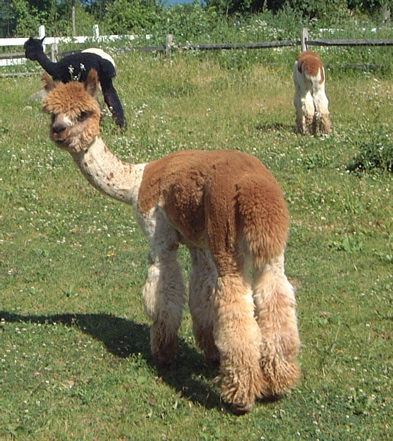
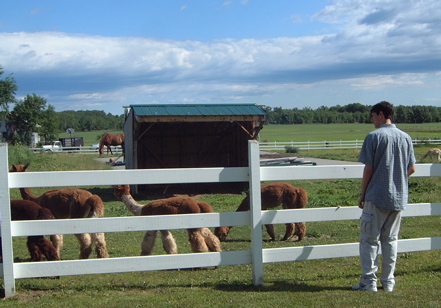
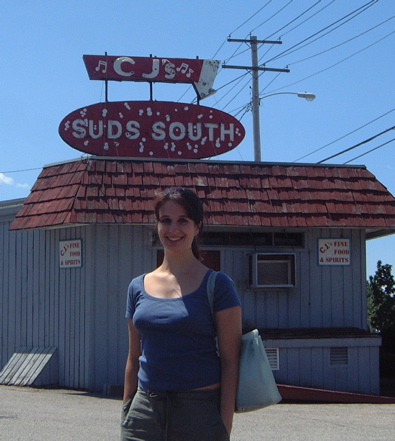 We
drive down the scenic way, skirting the border of Lake Champlain, through
Vergennes and then over to Rutland and across the state. We nearly take a
ferry into New York, but it’s more of a barge than what I think of as
a ferry. Yes, I admit it: I was expecting a version of the Staten Island Ferry—perhaps
somewhat smaller in scale, but the same sort of double-decker idea. This little
flat thing doesn’t cut it. I’m driving, and I decide we’ll
stop in Woodstock for a photo-opp at a "CJ" place and a cone at
a Ben & Jerry’s aattached to an ice-cream-friendly bookstore.
We
drive down the scenic way, skirting the border of Lake Champlain, through
Vergennes and then over to Rutland and across the state. We nearly take a
ferry into New York, but it’s more of a barge than what I think of as
a ferry. Yes, I admit it: I was expecting a version of the Staten Island Ferry—perhaps
somewhat smaller in scale, but the same sort of double-decker idea. This little
flat thing doesn’t cut it. I’m driving, and I decide we’ll
stop in Woodstock for a photo-opp at a "CJ" place and a cone at
a Ben & Jerry’s aattached to an ice-cream-friendly bookstore.
Robert starts driving after this, and he elects a stop at Pico, near Killington, for some alpine sledding down the ski mountain. It’s a truly terrifying experience: first of all, I’m still not sure how I navigated a ski lift without skiis, and the ride itself was full of uncomfortable, “do I brake or die?!” moments of panic. Everyone assures me I was in no danger at all, but I’m unconvinced. Skiing—and plain old sitting—are both much better.
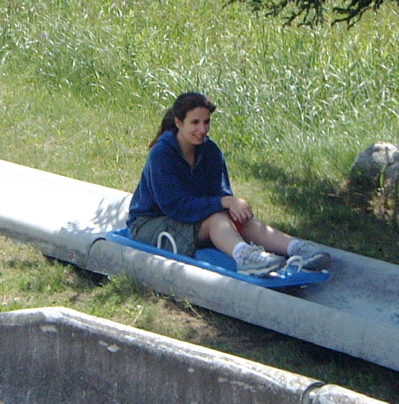
Our next destination is, once again, Queechee Gorge, where the corn man is there, and crazier than we remember him. He chats with us about incorrect corn grilling techniques, and we each eat two ears from his stand, liberally sprinkled with maple-pepper and brushed with butter. We immediately go inside to the store and buy some maple-pepper, as well as a maple-sugar-based cotton candy which is simply the best-tasting cotton candy I’ve ever eaten. All the way home Sunday afternoon, we feast on cotton candy and assorted remaining snacks from our journey.
